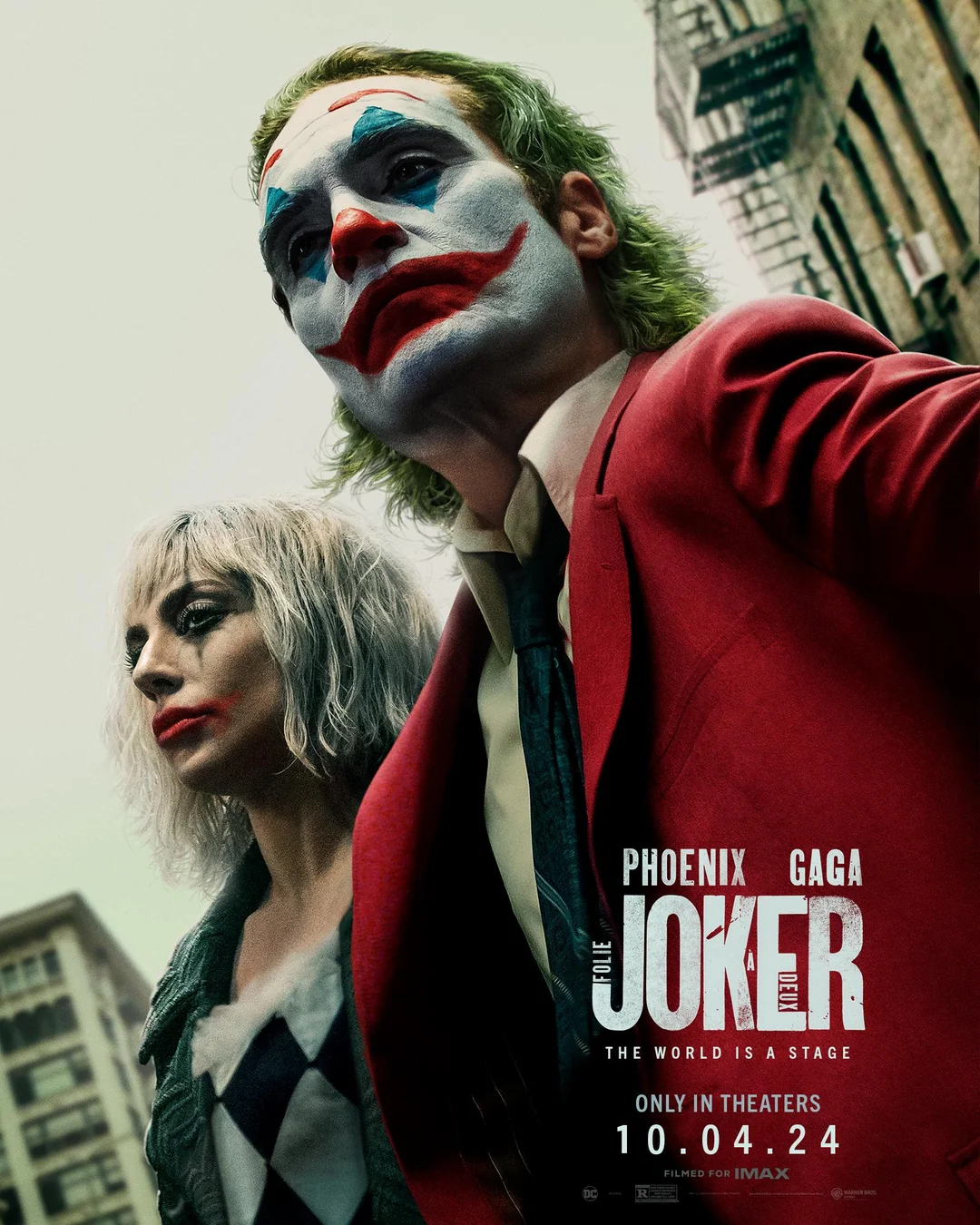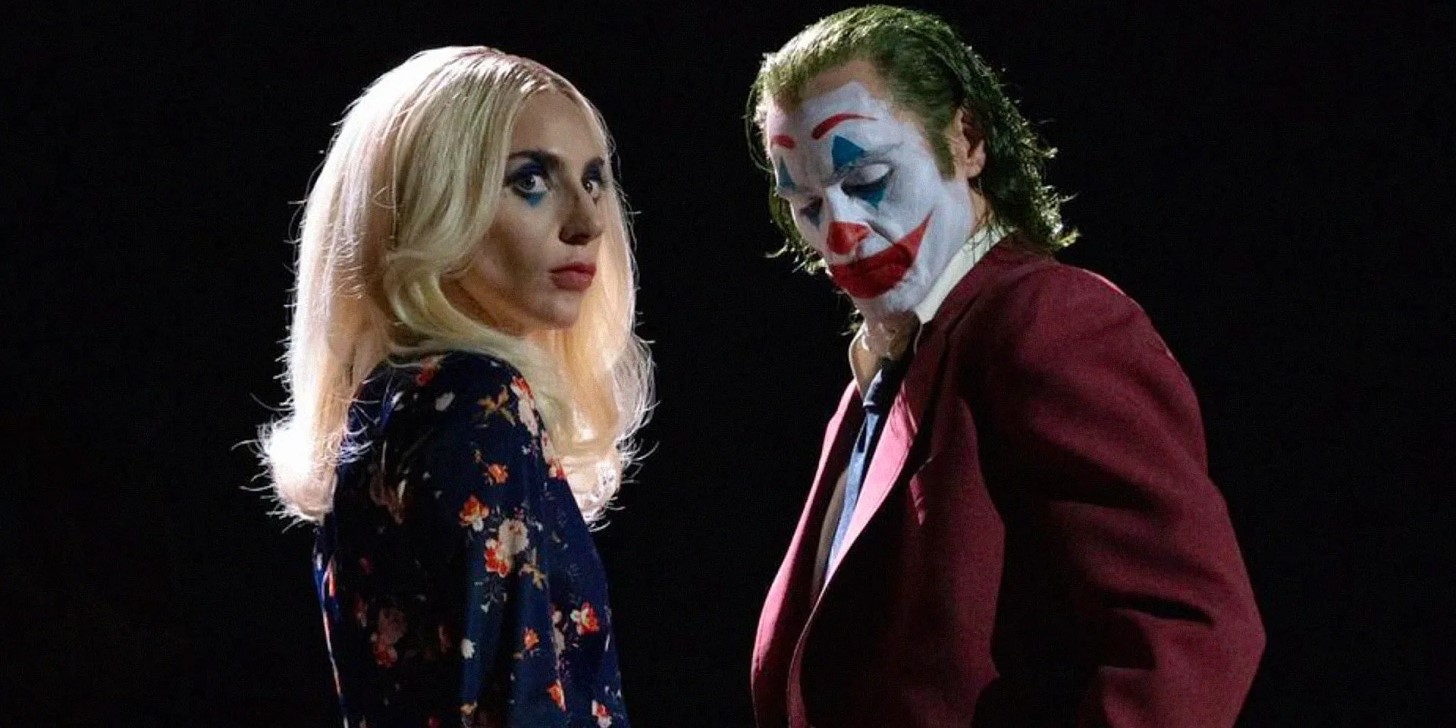
Director: Todd Phillips
Writers: Scott Silver, Todd Phillips (script), Bob Kane, Bill Finger, Jerry Robinson, Paul Dini, Bruce Timm (characters created by)
Cast: Joaquin Phoenix, Lady Gaga, Brendan Gleeson, Steve Coogan, Catherine Keener
Producers: Joseph Garner, Todd Phillips, Emma Tillinger Koskoff
Music: Hildur Guðnadóttir
Cinematographer: Lawrence Sher
Editor: Jeff Groth
Cert: 15
Running time: 138mins
Year: 2024

What’s the story: Gotham, early 1980s. Following the events of Joker, Arthur Fleck (Phoenix) is imprisoned in Arkham Institute, awaiting trial and sentencing. After falling for fellow inmate Lee Quinzel (Gaga), the more flamboyant side of Arthur’s character begins to surface once more.

What’s the verdict: Knock, knock? Who’s there? Joker. Joker Who? Joker’s on you for putting yourself through another bout of self-important posturing… Why aren’t you laughing?
Full disclosure: I was not an admirer of 2019’s Joker. A film whose central message boiled down to, “Just be angry,” its chic bleak posing was adolescent and self-satisfied. But I’ll concede that in those pre-Covid times, Todd Phillips’ movie struck a chord with anxious cinemagoers. To the tune of $1bn global box office and Oscars for Joaquin Phoenix and composer Hildur Guðnadóttir.
Even allowing for cinema’s current parlous health, Joker: Folie à Deux is not going to repeat the financial or cultural double punchline of its predecessor. Opening weekend box office has been solid, but unspectacular, and word-of-mouth will not be kind. Why? Because Folie à Deux is a folly so dumb.
The first film’s whiny navel-gazing and muddled demonisation of mental illness was tiresome, but at least it was striving for some kind of ideology. This sequel is hollow, and under heavy dramatic and intellectual sedation.
It is an anti-film. For all the ballyhoo about it being a musical, it is an anti-musical. There is Lady Gaga, and mumble-singing, and a few lumpen imagined nightclub sequences, but a musical this ain’t. Yet breathe not easy those who hate musicals; you will grow bored of Arthur and Lee singing jukebox hits to one another rather than developing any kind of character. The Harley Quinn given to Gaga here makes you pine for Margot Robbie’s manic turn, which says everything.
For all the anticipation of Phoenix and Gaga running wild as a loved-up pair of cuckoos feeding off each other’s madness (y’know, a folie à deux), this is an anti-romantic black comedy/drama/whatever. Where a dangerous energy should crackle is instead the grey sludge of a rote romance trudging a well-worn script path for anyone familiar with those previous auteur musical misfires, Francis Ford Coppola’s infamous vanity project flop One from the Heart (apparently a direct influence on this film) and Martin Scorsese’s infamous vanity project flop New York, New York. Not the best company to keep, but like this film those are two movies that blame the woman for the man’s immaturity and flaws. How far we’ve come.

What irks most is that this film could have done anything with its premise. When your first movie does a cool billion at the cinema, you have free reign to go wild in the sequel. This could have been a full-blown musical. Singin’ in the Rain crossed with Natural Born Killers. Bankrolling studio Warner Brothers is known for its classic gangster pictures, but it was Busby Berkeley musicals like 42nd Street and Footlight Parade that stopped the studio going under in the early 1930s. Why not invoke those? Or the Technicolor splendour of ‘40s and ‘50s classics such as the Fred Astaire and Cyd Charisse starring The Band Wagon, a snippet of which brightens up a scene here?
That the film opts against this means Gaga (and her distracting, era-inappropriate lip-filler) is not permitted to demonstrate her acting chops or silver screen charisma anything like the way she did in A Star Is Born. And reducing her to covering a jukebox soundtrack (even if it is Matt Munro, Frank Sinatra, Judy Garland, etc) seems oddly punitive.
Any other actor allowed to stand out? In nothing roles, Brendan Gleeson (bullyboy Arkham guard) and Steve Coogan (cynical TV interviewer) briefly perk up proceedings, but are wasted. Catherine Keener is a welcome sight as Arthur’s lawyer, but is saddled with a character who could be removed with barely a ripple felt. As for Phoenix? I’ve always run tepid on his tics and mannerisms, and his Joker here is simply more of what he served up in 2019.
Again, this could have done anything. A Looney Tunes inspired cartoon opens the film but fails to grasp what makes those bursts of animated anarchy brilliant. Although it does invoke the Jungian shadow archetype, which gave me early hope this sequel would do something interesting.
Also, why make the musical numbers imaginary? Why not a madness sweeping the city making everyone break out into song and dance? Fan service in the form of a surprise appearance from another major character from the Bat-verse isn’t enough to undo the sense of a major missed opportunity.
Making all this more aggravating is that Joker: Folie à Deux comes close to having a point. Late in the day, as the protracted courtroom trial is wrapping up, there is the suggestion that a demoralised society will rally behind a madman, becoming an unstoppable force not even he can control. Joker has always been a character onto which people vicariously project dark impulses, so is this idea not worth exploring more? Particularly as the film arrives from a country where a real-life comic book villain might shortly con his way back into The White House?
Mean Girls was a more subversive and provocative musical. Hell, even Wonka showed more daring. Both were good times at the movies. As for Folie à Deux … folie adieu et bon nuit.
Rob Daniel
Letterboxd: RobDan
Podcast: The Movie Robcast
